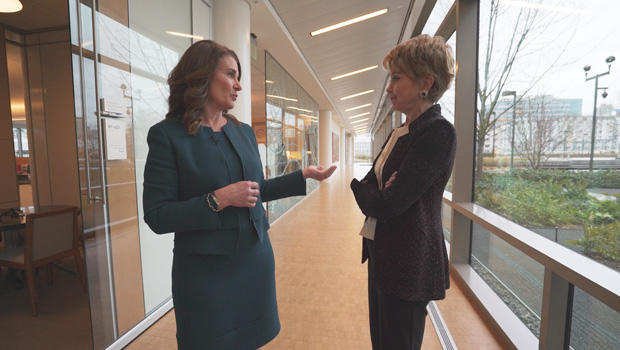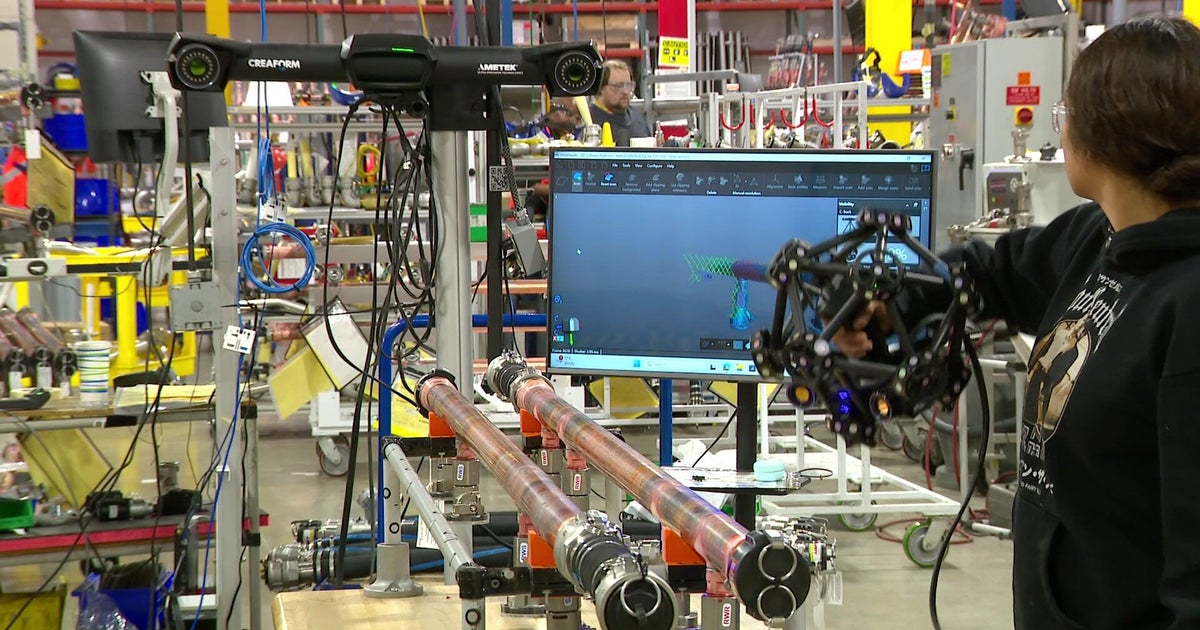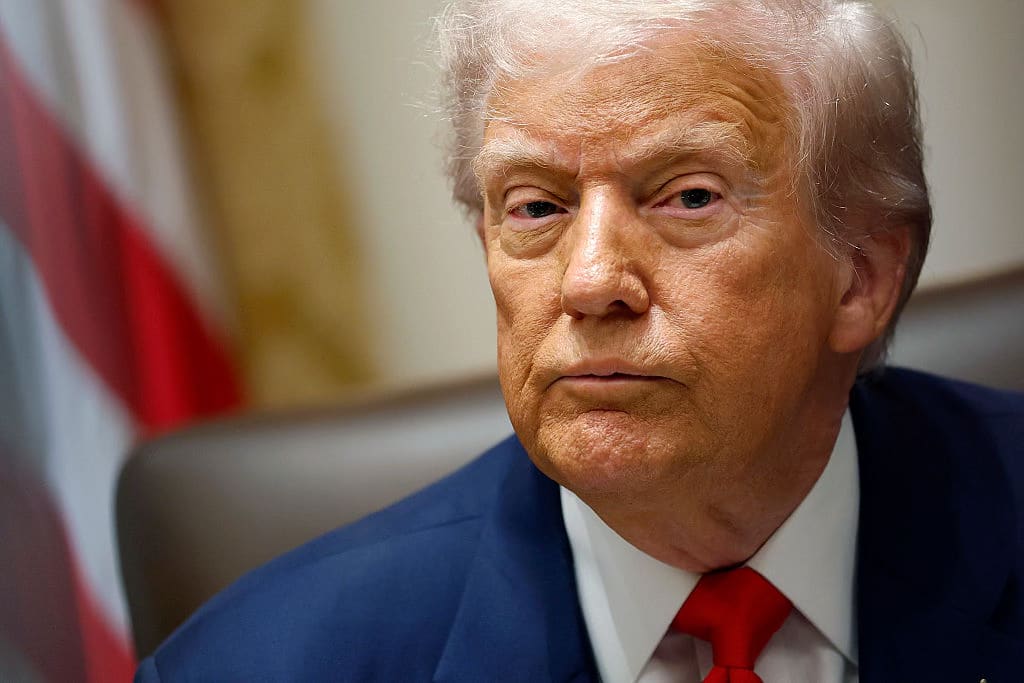Melinda Gates on making a successful life
Melinda Gates is a name to be reckoned with in the world of philanthropy. The aspirations of the charity she runs with her husband know almost no boundaries -- reason enough for Jane Pauley to sit down with her for some Questions and Answers:
They are the richest, and among the world’s most influential, power couples. The foundation that bears their names has given away nearly $40 billion, so far.
Pauley asked, “Your name is carved in equal-sized letters in the front. Is it a partnership of equals?”
“It’s absolutely a partnership of equals,” laughed Melinda Gates. “It’s important to both of us that the world understands that we are running this place together. This is our joint values being played out in the world.”
The Bill and Melinda Gates Foundation is the largest private charity in the world. Its $500 million headquarters was intended to make a statement as bold as its mission. Inside they are literally trying to save the world.
“I’ve asked an employee or two if to work here you have to pass an optimism test,” Pauley laughed. “Do you?”
“Well, yes, our work, the number of lives saved, I think just the exposure here would remind you that the plight of the poorest, as tough as it is, is improving,” said Bill Gates. “And we get to be a big part of that.”
“We are seeing progress,” Melinda Gates said. “And I think that those points of progress are points of light that employees can point to and say, ‘I was part of that. We did change the world. We are changing the world.’”
According to the United Nations, since 1990 global poverty has been cut in half. 122 million children’s lives have been saved through immunization, better nutrition and disease prevention -- areas in which the Gates Foundation has been a leading funder.
“What we’ve done as a world is we’ve done an incredible job of bringing down the number of deaths of children under the age of five, and that’s because of, basically, vaccines getting out there finally, and these malarial bed nets,” Melinda said. “And this is the great thing about math and why data is so important. Not only does Bill like data; I’m a computer scientist. I like data because data tells us where to go and how to act.”
For example, 1,000,000.
“One million children are the number of babies that die on the first day of life,” Melinda said. “Can you believe that? Still a million children die on the first day. So now we know we need to work on that piece of the problem.”
This number may astonish you: last year there were 37 cases of polio worldwide. “It’s the lowest number of cases we’ve ever had on the planet,” Melinda said. “And we think by next year we can drive that number to absolutely zero.”
The Gates Foundation has a more modest domestic agenda, focused on improving public schools. They’ve invested in charters and promoted education standards. But success has been more elusive.
“This is a tough problem,” Melinda said. “I don’t care how big your philanthropy is. We can set up experiences and points of light in places where we can show what can be done. Ultimately, everything that we’re doing takes government funding to lift it up and to fund it.”
Raised in Dallas, Melinda French was valedictorian at a Catholic academy for girls in 1982. Five years later, she graduated from Duke University with degrees in computer science, economics and a masters in business -- and a job offer from IBM, when a little known start-up caught her eye.
“I came out and interviewed with Microsoft. And I just thought, ‘Oh my gosh. I have to work at this company. They are changing the world. And if I get an offer, there’s no way I’m not going to take it.’”
Marrying the CEO, she added, “wasn’t part of my life plan!”
“I met her at a New York City sales meeting,” Bill Gates said. “And then it was only a week or so after that, that I went up to her in the parking lot and asked if she wanted to go out.”
Was Melinda ready for that? “No. I wasn’t!” she laughed. “When we met, and Bill is CEO of Microsoft and I was, you know, all of 23, he actually, at that first date, asked me out for two weeks from Saturday night. And I said, ‘Two weeks from Saturday night? How could you possibly know what you’re doing? My schedule doesn’t go out that far.’”
Mary Lehman, who has been Melinda’s best friend since high school,” recalled, “I thought, ‘Wow, wouldn’t cha know, she’s already met the CEO and he likes her!”
Pauley asked Lehman, “Did you imagine that she was going to marry him?”
“No. Probably not then. But I thought, you know, great for her.”
“She got to see what it was really like,” Melinda said. “I mean, games and puzzles. We played water volleyball one night in his pool, just the three of us!”
“What impressed me the most when I met him,” Lehman added, “was just how down-to-earth he was and how fun.”
After a seven-year courtship, Melinda and Bill married in 1994.
The next year Microsoft released Windows 95, revolutionizing the personal computer, and at 39, Bill Gates was named the “Richest Person in the World.”
The following year, pregnant with their first child, Melinda surprised Bill with news that she meant to be a stay-at-home mom.
“He was surprised, he was definitely surprised,” Melinda laughed. “But I said to him, ‘You know, it just doesn’t make sense. You can’t be the CEO and go as hard as you’re going and -- somebody has to be at home, right? We didn’t want our children raised by somebody else. I said, ‘You know, if we want them to have the values we have, somebody has to be home.’”
Their three children grew up in a 66,000-square-foot mansion overlooking Lake Washington in suburban Seattle.
Since creating the foundation in 2000, Bill and Melinda have traveled the world seeking out the places their money can do the most good. But Melinda shunned the spotlight -- until five years ago, when she took on a cause of her own, and discovered how harsh the spotlight can be.
“When you think about family planning,” she said in a speech, “from the perception of a woman, it will change the way you think about family planning.”
The first time she stepped onto a public stage was to deliver an important address about contraceptives. Pauley said, “And you discovered how controversial contraceptives can be, as only a Catholic girl who got in trouble with the Vatican over it would know. You got slapped down by the Vatican.”
- Melinda Gates takes on the Vatican (The New Yorker, 07/11/12)
“It’s okay. I’m doing the right thing,” she replied. “There are 225 million women asking us for contraceptives. They’re asking us. And I meet women who’d die because they don’t have access to contraceptives. I meet women who beg me to take their children back to the United States.
“I had a woman say to me, ‘Take two of my children.’ I said, ‘I’m so sorry, I can’t.’ And she says, ‘Well then, take one.’ I mean, these are people living in extreme circumstances. You can’t turn your back on people like that.
“I grew up in the Catholic church that has a social justice mission. In fact, they used to talk about the cries of the poor. I’ve heard the cries of the poor. And we need to give access to women to contraceptives.”
“What did Bill say? He admits that he thought women’s issues, including contraceptives, were ‘soft’ issues. Now, it’s, like, a priority for him.”
“It’s a huge priority,” Melinda said. “Because he sees the data.”
Pauley asked Bill, “What do the two of you separately bring to your individual partnership that strengthens your capacities?”
He replied, “We both go out and try and see the people we serve. But she does that even better than I do, does even more of that than I do.”
“When I come back from a field visit, the first person I want to talk to about on the phone or at home [about it] is Bill,” she continued. “Both to tell him the stories of their lives, but then also for us to put our brains together and say, ‘Well, what else could we do? How could we make it better? Do we really know that what they’re saying to us in the field, does that add up to the data that we’re seeing or not?’”
Ultimately the key to their legacy may be their philanthropy. Which makes you wonder: Would Bill Gates be having the most impactful second act since Andrew Carnegie without Melinda?
Melinda told Pauley, “I read this poem that I loved at my high school graduation speech about what a successful life was to me. And it’s to know that one life has breathed easier because you’ve lived. To me, that’s success.”
- Bill and Melinda Gates: The $60 billion donation (“60 Minutes,” 10/03/10)
For more info:







